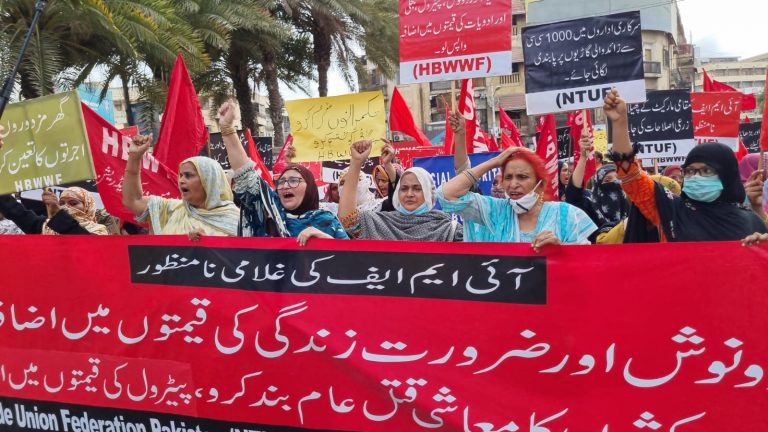
Public perception exists that there are literally two Pakistans: one is for the privileged sections of society which is the developed, prosperous having enough resources to address their needs, the other is for the vast majority which is underdeveloped, poverty-stricken and unable to meet their urgent needs.
Nazeer Ahmed Arijo
Many opinion-makers have compared Pakistan’s ongoing devastating financial crises to the current crisis of Sri Lanka, sending shivers down the spine of Pakistanis.
After having ascended to the throne, PM Shahbaz Sharif said he would sell his clothes to provide cheap flour to the population. This commitment faltered sooner than expected. The incumbent PDM led-government hiked the prices of petroleum products twice in less than a month by Rs.30 respectively. As if this were not enough. On June 1st, prices of cooking oil were hiked by Rs213 per kg. Besides, to pave the way for a stalled IMF program, the Oil and Gas Regulatory Authority (OGRA) determined a 45 per cent increase in prices of natural gas for the 2022-23 fiscal year to meet revenue requirements of the two gas utilities — SNGPL and SSGCL. The federal budget with outlay of Rs9.5tr 2022-23 presented failed to offer relief to vulnerable sections facing inflationary storm –not to mention relief given to the salaried, pensioners and bureaucracy.
The hikes in the prices of petroleum products, cooking oil and natural gas at the drop of hat, baffled the mind of the majority that is trapped in poverty. The masses have been forewarned of the booster doze i.e. hike in the prices of items elaborated above in the days to come by the economic experts. The inflation-stricken people- the ordinary have started asking questions as to why policies formulated and implemented under tough economic conditions called (IMF mandated) always burden the already burdened. For the first time in the history of Pakistan, the concerns conveyed by across the sections of society, compelled those in power corridors to revisit the economic model that continues to accommodate the minority subsequently asking to end economic patronage to the civil, military, judicial bureaucracy and ruling elites. Faced with public fury, under the austerity drive, Sindh CM Murad Ali Shah blazed a trail in terms of slashing the petrol quota of the ministers and government officials by 40 percent. It thus put symbolic pressure on the federal government to follow the suit. Ghulam Qasim, a primary teacher took to the social media networking site Facebook and uploaded his input on the hikes in question having said that: I buy petrol, afford the educational expenses of my children, and support my family from my salary. Why the same policy can’t be applied to the powerful like the judges, generals, and bureaucracy and ministers already drawing handsome salaries? Why can’t the free quota of petrol and financial facilities granted to this oligarchy be revoked to lessen the burden on the federal and provincial governments? Rising waves of tsunami called inflation prompted another person who took to the Twitter tweeting against rising prices subsequently asking why the IMF was not asking for revoking the economic patronage given to the wealthy instead of asking the government to end subsidy on petroleum products ultimately unleashing unimaginable economic troubles caused by the trickle-down effect of rising prices of petrol and diesel on the majority that lives below the breadline. The truth is that the International Monetary Fund (IMF) and other International lending Entities are a symbol of global financial governance -a colonial economic structure active to bleed weak economies dry with its manipulative economic agenda while giving bailout packages to borrower states. Ruling minority and other power structures in weak economies facilitate the Fund to implement its manipulative monetary mechanisms.
An analyst Ammar Ali Jan gave the credence to the claim aforementioned saying “Pakistan has a separatist elite that wishes to remove itself from the general masses. It directs economic policies to subsidize corporate, feudal, and military interests at the expense of the general public. This moribund economic structure is sustained by foreign aid in exchange for the country’s services as a rentier state to global powers. As a result, we witness a permanent economic emergency in which the masses are forced to sacrifice their interests in the name of the alleged economic health of the nation. The fight for political democracy will remain untenable without challenging the economic model fueling inequality, fear, and militarization in society”. The public demonstration by the working-class people at Karachi in Regal Chowk under the banner of” Protest against IMF policies and inflation” does demonstrate utter disillusionment with the established political order premised on indifference to the urgent needs of the ordinary. 43% of Pakistanis are said to experience food insecurity, and millions are educated but jobless. Given such circumstances, the public raised their eyebrows at the increase of the military budget by 6% to Rs 1.45 trillion and as high as 150% increase in bureaucracy’s allowance. Earlier, President Arif Alvi had given the nod for 10% increase in the salary and daily allowance of the Supreme Court and High Court judges respectively on the advice of the PM. This whopping increase in the salary and allowance of the already privileged sections were granted while the ordinary were being asked to bear the brunt of toughest economic decisions following economic crisis. Instances such as these do demonstrate both deep-rooted double standards and structural imbalances.
Usually, the sitting government has been accusing the previous regime of economic ills faced by the country. We heard Finance Minister Muftah Ismail passing the buck to the previous regime of PTI. The reality is otherwise. The blame for the melting national economy can’t be put at the door of any particular government- all the past and the present- are naked in this bath called an economic mess besetting the country. It is the result of decades-long bad economic policies pursued PML N, PPP and PTI, etc. during their respective tenures.
Faced with public anger, What PM Shahbaz Sharif offered was that the incumbent government had to raise petroleum prices with a heavy heart, as petrol prices skyrocket around the globe. However, the masses are fed up with such explanations. After all, the explanations given can’t feed the hungry.
Never before have I seen such indignation against exploiters in the eyes of the exploited. This is an unprecedented anger that those at the helm of the country’s affairs have witnessed.
Neither the political party whose whole edifice stands on its keyboard warriors nor PML N and PPP are seen as saviors. The disillusionment with political parties is too deep and beyond repair. Questions raised and concerns convincingly conveyed do demonstrate underlying volcanic outbreaks i.e. emotions ready to shape up resistance- against established economic order indifferent to the economically disadvantaged. There is a long-standing public perception that there are literally two Pakistans: one is for the privileged sections of society which is the developed, prosperous and generous enough to address their needs, the other is for the vast majority which is underdeveloped, poverty-stricken and deaf to their urgent needs.
I see seeds of change planted. I see light at the end of the tunnel. Today, people are asking questions about unjust economic policies as well as unequal distribution of wealth. Tomorrow, they will be demanding answers. If things did not improve, they would make sure that their voice is heard and that questions are answered. The demand by the deprived majority is simple: They want immediate and definite improvement in their crippling economic conditions. History is a witness to the fact that when the ordinary, the shirtless have woken up, no power on the earth can silence them. No political structure will remain intact if it does not feed and facilitate the vast majority. According to Thomas Carlyle, the French revolution was the result of the bitter misery of the poor in later seventeenth-century France; it was the revolt of the hungry against the well-fed, of the oppressed against the oppressors. This should be really eye- opener for Pakistani elites presiding over discriminatory economic model. A great many people believe that ethnic and provincial considerations run deep in society of ours ultimately underlining any meaningful political movement for the restoration of rights enshrined in the constitution of Pakistan. Yes, it is. However, inflation and subsequent losing purchasing power is common problem being faced by the ordinary throughout the country. Hunger has no borders and ethnicity. We are reminded by the human history that the deprived and the hungry did unite to attain desired results what big political platforms failed to achieve. Every cloud has a silver lining.
___________________
 Nazeer Ahmed Arijo is a freelance writer. He can be accessed at nazeerarijo@gmail.com
Nazeer Ahmed Arijo is a freelance writer. He can be accessed at nazeerarijo@gmail.com
(This article has been uploaded again as it was one of several files destroyed a few days back due to fault in database)